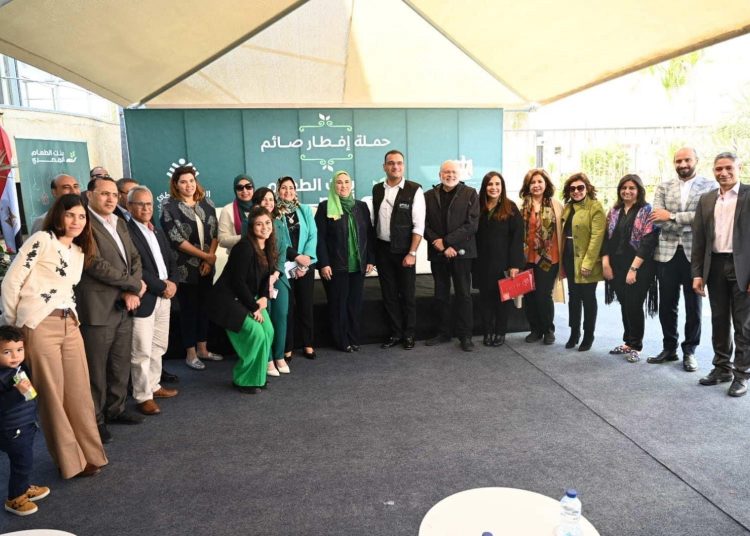The Egyptian Food Bank held a press conference today at its headquarters in the Third Settlement, New Cairo, unveiling its program for the upcoming holy month of Ramadan, with a special focus on the “Iftar Saeem” campaign. The conference saw the presence of prominent figures including her Excellency Nevine El-Kabbaj, Minister of Social Solidarity, Dr. Osama El-Azhary, the president’s adviser on religious affairs, and Dr. Khaled Qasim, Assistant to the Minister of Local Development and the official spokesman. Also in attendance were Dr. Niazi Salam, Chairman of the Egyptian Food Bank, Mohsen Sarhan, CEO of the Egyptian Food Bank, and Consultant Saeed Saleh, Adviser to the Minister of Agriculture for Follow-up, alongside Dr. Ayman Abdel-Al, Head of the Central Administration for Research Stations and Agricultural Experiments, and Naglaa Nosseir, CSR Director of Telecom Egypt (WE).
The press conference included a comprehensive presentation of the Egyptian Food Bank’s plan to implement food programs during the holy month of Ramadan 2024, particularly the “Iftar Saeem” campaign. This campaign operates under the theme “Food… A Basic Life Need “and utilizes a massive database owned by the Egyptian Food Bank, containing approximately 9 million citizens across Egypt. This database aims to reach the largest number of beneficiaries to provide them with the necessary and healthy nutritious food. Over the past 20 years, the Egyptian Food Bank has effectively fulfilled this role as the first and largest specialized institution in food provision, operating on a voluntary basis to serve Egyptians and ensure their food security.
Furthermore, in response to volunteers’ interest in participating in activities, the Egyptian Food Bank announced during the conference the launch of a new interactive volunteering program accessible for everyone to volunteer and contribute. Additionally, the Egyptian Food Bank introduced a new donation digitalized method called “Code El Kheir,” allowing individuals to donate directly to any beneficiary. Donors can input either their personal number or the beneficiary’s number, with beneficiaries able to redeem the code at the nearest supermarket from the Egyptian Food Bank’s partners. This initiative aims to offer flexibility and convenience in supporting the underprivileged to have the freedom. The concept was introduced through an advertisement broadcast in mid-February, presented by actor Ahmed Dawood, who explained the process of utilizing the code.
Mohsen Sarhan, CEO of the Egyptian Food Bank, expressed gratitude to Nevine El-Kabbag, Minister of Social Solidarity, for her steadfast and unwavering support for all the Egyptian Food Bank’s activities. He affirmed the Egyptian Food Bank’s commitment to executing its activities professionally and comprehensively throughout the holy month to ensure food security for the deserving. The Egyptian Food Bank aims to increase its program implementation rates year after year to reach more beneficiaries and cater to their diverse needs.
For her part, Nevine El-Kabbag, The Minister of Social Solidarity, expressed her profound enthusiasm in participating in the launch of the campaign, which coincides with celebrating 20 years since the establishment of The Egyptian Food Bank. Over the past two decades, there has been continuous dedication and escalating efforts within the framework of sustainable development and outstanding partnerships to serve the community and engage in social investment. This investment has proven beneficial in combating hunger through food security initiatives, demonstrating innovation within Egypt and inspiring numerous Food Bank replicas worldwide, which highlights its credibility and strategic thinking to achieve sustainable resources and funding. As the first Egyptian institution established to combat hunger under the name “Bank”, The Egyptian Food Bank stands as an expertise hub in food security and poverty alleviation.
The press conference featured speeches from attendees praising the performance of the Egyptian Food Bank and declaring their full support for all activities carried out during Ramadan and throughout the year. Additionally, Mohsen Sarhan led the attendees on a tour of the new interactive volunteering experience within the Egyptian Food Bank’s packaging factory. They also conducted an inspection of the ‘Tekeya Al-Mahrousa’ project launched by the Egyptian Food Bank, alongside observing the progress of work within the ‘Tekeya Al-Mahrousa’ – the mobile kitchen – committed to distributing hot meals in Egypt’s streets, representing a significant stride in addressing the nutritional needs of the most vulnerable families. Additionally, the attendees observed the ongoing preparations for the primary “Mawed Rahman” Iftar tables for free” hosted by the Egyptian Food Bank.
The Egyptian Food Bank’s activities during Ramadan include distributing “Farhet Ramadan” boxes containing food items to deserving individuals in villages, remote areas, and border regions across the country. This distribution relies on regularly updated databases to reach the most needy families, benefiting over a million households during the holy month. Other activities include hosting “Mawed Rahman” in all governorates, serving approximately 500 individuals per table daily, as well as the “Shantet El Mahata” program, a collaborative effort with the Ministry of Transport to distribute bags containing water and dates to travelers in Egypt’s various transportation stations during Iftar time.
During Ramadan 2023, the Egyptian Food Bank successfully implemented the “Iftar Saeem” program, reaching a large number of deserving individuals, totaling 7 million people from eligible families and groups. The Egyptian Food Bank also launched 20 convoys containing food boxes sent to several governorates and continued its annual tradition of distributing 7,000 additional food boxes through the “Otobes El Ozouma” for the eighth consecutive year. Additionally, they hosted 100 “Mawed Rahman” across all Egyptian governorates, accommodating between 250 to 700 beneficiaries daily throughout the holy month, thereby providing Iftar meals to nearly 1.75 million individuals, along with numerous other charitable and voluntary activities throughout the month.






Discussion about this post